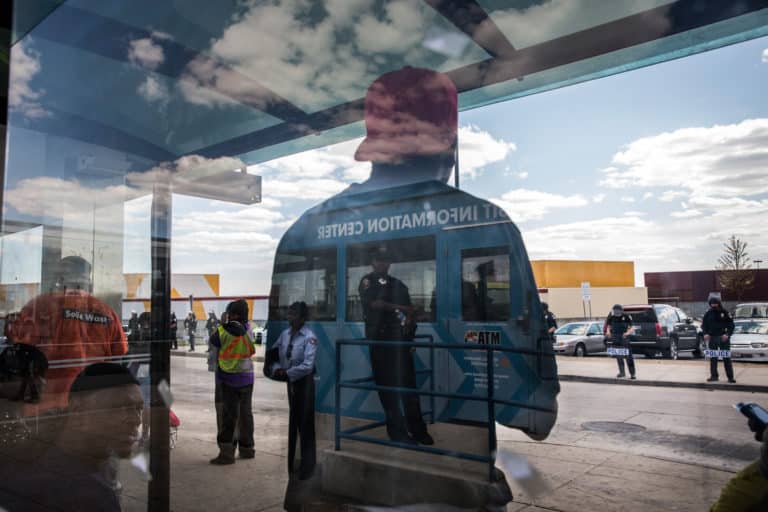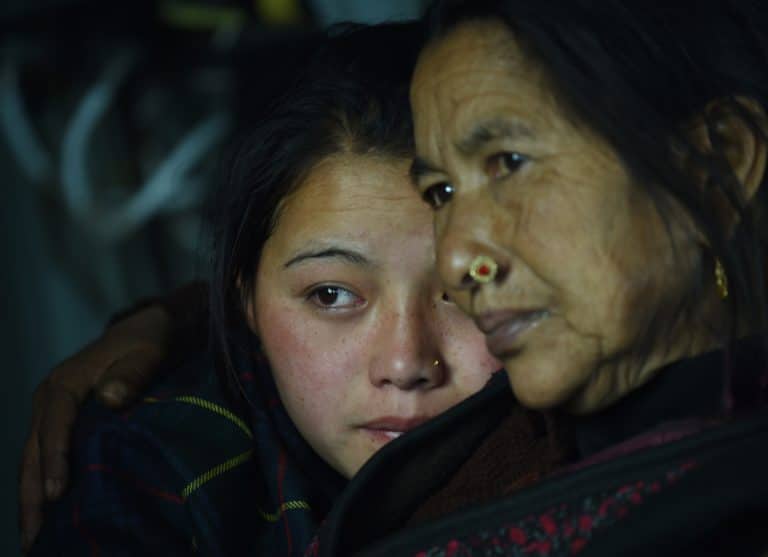
Image by Andrew Burton/Getty Images..
Between Nepal and Baltimore
Nepal under rubbles. Pain in Baltimore.
This week my heart kept being pulled into two earthquakes of human suffering: the earthquake in Nepal and the Baltimore uprising in the aftermath of the death of Freddie Gray.
With Nepal, I find little use in theological speculation of “why do bad things happen to good people.” I see the death toll rise like a demonic snake before our eyes: 400….700….1500…2000…3000…4000. The latest numbers as of now are that the final death toll may be as high as 10,000.
No, I don’t know where God was when the earthquake happened. I suspect God is where God has always been — mingling with humanity, starting with the suffering. I suspect that God is in the rubble — with those buried under and those pulling up the buried from under the rubble.
Here is what I do know is happening: the outpouring of human kindness. That’s always been the question for me — not where is God, but where are we? Almost everywhere I see the outpouring of genuine concern, the streaming of tears, and a reverent respect for the dead and the living.
Mingled with the shocked state of grief was the immediate response I heard everywhere: How can I help? What can I do to help?
This is humanity at our best.
How amazing that when we see “acts of God” destruction, the devastation brought by nature, we do not pause to ask about the race of the suffering. We do not ask about their religion or what political ideology they supported. We do not ask any question other than how can we help?
We speak little, sit in silence and grief, and we reach out in compassion. What a beautiful response. How I wish it were not restricted to natural catastrophes.

And then there is the eruption of a 40-year suffering in Baltimore, coming to the forefront after the killing of Freddie Gray.
The response to Baltimore has been radically different than the response to Nepal.
Depending on which circle you’re in, you have seen very different characterizations to the demonstrations/riots that have erupted in the aftermath of the death of Freddie Gray. Freddie Gray, of course, was the healthy young African-American man whose leg was broken by the police, whose voice box was shattered, and who was carried in a police vehicle in a “rough rider” style. By the time he arrived at the hospital, he was incapacitated. He died a week later.
On one side of theresponse, there are the images that we see over and over again in mainstream media. Cars being smashed. A CVS pharmacy being set on fire. Words like “thugs” are tossed around, as some have said, in a way that is reminiscent of the new N-word. The Roots’ Ahmir Thompson, better known as Questlove, reminded everyone of that in a tweet.
“Thugs” = Niggers #KnowTheCode
— Questlove Gomez (@questlove) April 28, 2015
On another side was a discourse dominated by many people of color and social justice allies. These folks wanted to know why it is that the destruction of property warrants around the clock coverage, but the destruction of primarily black and brown bodies does not. Jesse Williams perhaps said it best:
You want us to condemn black folks being violent against PROPERTY but you NEVER condemn police killing actual PEOPLE. #Explain #JustTry
— jesseWilliams. (@iJesseWilliams) April 28, 2015
Yes, life is complicated when we humans are involved in both receiving and dishing out suffering.
Even when we live in the same city, we don’t live in the same neighborhood. Baltimore, the same city that features the world famous Johns Hopkins medical facilities, also has infant mortality rates comparable to Belize and Moldova.
These eruptions go back years and decades. Between 2011 and 2014, the city of Baltimore had to spend over five million dollars settling law suits against their police. They go back to Baltimore neighborhoods where 60 percent of high school students do not graduate. And there is this sobering piece of news; in the Sandtown-Winchester and Harlem Park neighborhoods where Freddie Gray was arrested, “more than half of people aged 16 through 64 are unemployed.”
The “riots”/uprisings did not start with Freddie Gray. They are the tipping point of a tension that started some 40 years ago. There is a context that includes colliding lines of class and race, police brutality, failed public institutions, and far too many lives shattered.
Yes, it’s complicated. Freddie Gray and Michael Brown and so many other black men become the outlets for the pain of suffering of so many, built up for too long. Freddie’s mother distanced herself from the destruction of the riots, stating: “Don’t tear up the whole city just for him…That’s wrong.”
Yes, it’s complicated.
Baltimore’s own Ray Lewis, for so long the heart of the city’s beloved NFL team, released an emotional message asking the rioters to go home.
I’ve got a message for the rioters in Baltimore. #BaltimoreRiots
Posted by Ray Lewis on Tuesday, April 28, 2015
Yes, it’s complicated. Ray Lewis is a champion, adored by many, fabulously wealthy, and was implicated in a murder investigation himself. Yes, it’s complicated.
Violence is woven into the fabric of almost every dimension of our lives. We celebrate violence, ritualized as sports. The NFL is our national religion. This weekend millions of people will pay each to watch two men beat the crap out of each other in what’s expected to be the richest boxing match in history. We are addicted to entertainment through violence.
We unleash our violence on the rest of the world, which we excuse since it’s committed by a state. There’s violence in far too many of our homes. The military-industrial complex reaches down to each and every single state in America. We drone human beings in Yemen, Somalia, Afghanistan, and Pakistan. We have created a world in which a black man is killed by the police every 28 hours. We have the militarization of the whole urban landscape, through billions of dollars of war-grade military machinery moving into urban neighborhoods, treating primarily black and brown bodies through techniques and weaponry designed to fight other human beings we have already demonized as “terrorism” threats. We have 2.5 million people in a prison industrial complex, yet we act disappointed and outraged when (primarily black and brown) urban populations overturn a few cars and burn some property.
I never sanction violence. Never. But I wonder how we got to the point when destruction of property deserves greater coverage and a greater portion of our attention than the destruction of human life. Since when do shattered windows matter more than shattered spines, shattered voice boxes, and shattered dreams? When did we become a people who mourn the destruction of things over the destruction of lives?
I hear the calls for nonviolence. I hear those who wish that the communities in Ferguson and Baltimore would “behave more like Martin Luther King.” I wonder about these voices — including my own voice — and where they were, where I was, where we are when human beings are killed each and every day on our streets. I wonder where we are when we have a nation of 300 million people and 300 million guns. I wonder….
Of course I recognize that there is something beautiful and noble about nonviolence. For nonviolence to be meaningful, we also have to be addressing the structures and institutions of violence, including systematic racism, police brutality, and state violence. Otherwise, a call for nonviolence without addressing the above sounds hollow because it is hollow. If seeing pharmacies and cars destroyed fills us with a sense of despair and a recognition that this is not the way forward, did we call for “nonviolence” with Michael Brown? With Freddie Gray? With the thousand others whose lives have been destroyed and humiliated?
As for the invocations of Martin Luther King, I wonder if we have reflected on Martin’s own words about riots:
“A riot is the language of the unheard.”
And right before that, Martin had said:
“But it is not enough for me to stand before you tonight and condemn riots. It would be morally irresponsible for me to do that without, at the same time, condemning the contingent, intolerable conditions that exist in our society. These conditions are the things that cause individuals to feel that they have no other alternative than to engage in violent rebellions to get attention.”
Look behind the headlines. Look through the photogenic images, and you will hear voices of anguish. You’ll also see voices of deep humanity, compassion, and strength. Here is one strong and dignified response from Farajii Muhammad, a Muslim leader in Baltimore in an organization called Peace by Piece:
#Baltimore activist and radio host Farajii Muhammad is a strong
#Baltimore activist and radio host Farajii Muhammad is a strong voice for his city and the protesters call for justicePosted by Carol Costello on Tuesday, April 28, 2015
Let me come back to Nepal and Baltimore.
I know that we as human beings are capable of reaching out beyond the confine of our own concern. I know that we are capable of doing so when the “offensive” agent is the only mother all of us share: Mother Nature. We do not lash out against nature, or God, but reach out in compassion to one another. It’s harder for us to exhibit the same compassion when we humans are involved. How hard it is for us to recognize justice at a holistic level. How challenging, and marvelous, to stand up for justice, no matter who is behind it and who it stands against.
I see us in pain, in suffering — some of us in anger, others in fear. How I’d like to see us embody the ethics of Nepal, reaching out in compassion.
But first, there are bodies to bury. Thousands of bodies under the rubble.
And there is anger that demands to be given voice
A rage that dares sleep not
An injustice that needs to be buried.
May God help us in all the burials we face ahead.

